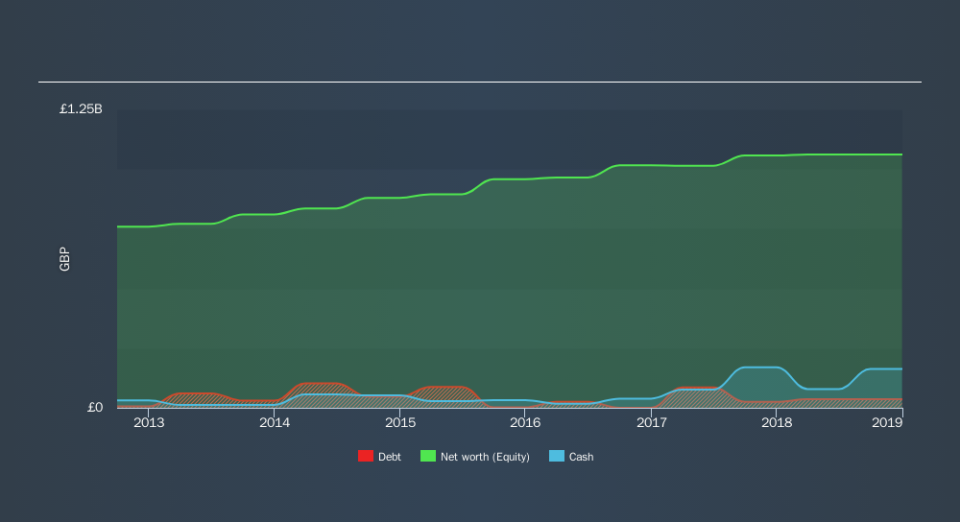Bovis Homes Group (LON:BVS) Seems To Use Debt Rather Sparingly

Some say volatility, rather than debt, is the best way to think about risk as an investor, but Warren Buffett famously said that 'Volatility is far from synonymous with risk.' So it might be obvious that you need to consider debt, when you think about how risky any given stock is, because too much debt can sink a company. We can see that Bovis Homes Group PLC (LON:BVS) does use debt in its business. But the real question is whether this debt is making the company risky.
When Is Debt A Problem?
Debt assists a business until the business has trouble paying it off, either with new capital or with free cash flow. Part and parcel of capitalism is the process of 'creative destruction' where failed businesses are mercilessly liquidated by their bankers. However, a more common (but still painful) scenario is that it has to raise new equity capital at a low price, thus permanently diluting shareholders. Of course, debt can be an important tool in businesses, particularly capital heavy businesses. When we think about a company's use of debt, we first look at cash and debt together.
See our latest analysis for Bovis Homes Group
How Much Debt Does Bovis Homes Group Carry?
You can click the graphic below for the historical numbers, but it shows that as of December 2018 Bovis Homes Group had UK£36.4m of debt, an increase on UK£25.2m, over one year. But it also has UK£163.2m in cash to offset that, meaning it has UK£126.8m net cash.
How Healthy Is Bovis Homes Group's Balance Sheet?
The latest balance sheet data shows that Bovis Homes Group had liabilities of UK£301.6m due within a year, and liabilities of UK£220.9m falling due after that. Offsetting these obligations, it had cash of UK£163.2m as well as receivables valued at UK£45.6m due within 12 months. So its liabilities total UK£313.7m more than the combination of its cash and short-term receivables.
Bovis Homes Group has a market capitalization of UK£1.42b, so it could very likely raise cash to ameliorate its balance sheet, if the need arose. However, it is still worthwhile taking a close look at its ability to pay off debt. While it does have liabilities worth noting, Bovis Homes Group also has more cash than debt, so we're pretty confident it can manage its debt safely.
On top of that, Bovis Homes Group grew its EBIT by 36% over the last twelve months, and that growth will make it easier to handle its debt. The balance sheet is clearly the area to focus on when you are analysing debt. But it is future earnings, more than anything, that will determine Bovis Homes Group's ability to maintain a healthy balance sheet going forward. So if you want to see what the professionals think, you might find this free report on analyst profit forecasts to be interesting.
But our final consideration is also important, because a company cannot pay debt with paper profits; it needs cold hard cash. Bovis Homes Group may have net cash on the balance sheet, but it is still interesting to look at how well the business converts its earnings before interest and tax (EBIT) to free cash flow, because that will influence both its need for, and its capacity to manage debt. Over the most recent three years, Bovis Homes Group recorded free cash flow worth 74% of its EBIT, which is around normal, given free cash flow excludes interest and tax. This cold hard cash means it can reduce its debt when it wants to.
Summing up
While Bovis Homes Group does have more liabilities than liquid assets, it also has net cash of UK£127m. And we liked the look of last year's 36% year-on-year EBIT growth. So is Bovis Homes Group's debt a risk? It doesn't seem so to us. Another factor that would give us confidence in Bovis Homes Group would be if insiders have been buying shares: if you're conscious of that signal too, you can find out instantly by clicking this link.
If, after all that, you're more interested in a fast growing company with a rock-solid balance sheet, then check out our list of net cash growth stocks without delay.
We aim to bring you long-term focused research analysis driven by fundamental data. Note that our analysis may not factor in the latest price-sensitive company announcements or qualitative material.
If you spot an error that warrants correction, please contact the editor at editorial-team@simplywallst.com. This article by Simply Wall St is general in nature. It does not constitute a recommendation to buy or sell any stock, and does not take account of your objectives, or your financial situation. Simply Wall St has no position in the stocks mentioned. Thank you for reading.

 Yahoo Finance
Yahoo Finance 
